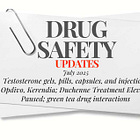August 10, 2025: New Drug Approvals for Brain, Lung cancer; Migraine Treatment for Kids; AI therapy banned in IL; Alzheimer's Link to Lithium Levels
New Drug Approval: Modeyso for Brain Cancer
Jazz's Modeyso (dordaviprone) was approved for a type of aggressive brain cancer called diffuse midline glioma. The treatment, formulated as capsules taken weekly, is for patients age 1 and up who have progressive disease and have had prior therapy. The FDA granted the medicine accelerated approval based on results of a trial of 50 patients participating in five open-label, nonrandomized U.S. trials. The overall response rate (patients who responded positively to the drug) was 22% and the median duration of the positive response was 10.3 months.
FDA Press Release
Diffuse midline glioma was the same type of brain cancer that took the life of actress Kelley Mack this week.
Fierce Pharma: “Jazz’s Modeyso Becomes First FDA-Approved Drug for This Type of Aggressive Brain Cancer”
New Drug Approval: Hernexeos for Lung Cancer
Boehringer Ingelheim’s Hernexeos (zongertinib) was approved under an accelerated approval pathway to treat metastatic Non-Small Cell Lung Cancer (NSCLC) that has certain mutations (HER2 positive and TKD or tyrosine kinase domain) as detected by the companion test. In a trial, among 71 patients who had received platinum-based chemotherapy but had not previously been treated with a HER2-targeted tyrosine kinase inhibitor, the overall positive response rate was 75%, with 58% responding for 6 months or more. The dosage for the daily tablets is based on body weight. NSCLC is the most common type of lung cancer.
Expanded Approval for Ajovy Migraine Drug
Teva’s migraine treatment Ajovy (fremanezumab) received expanded approval for preventive treatment of episodic migraine in pediatric patients who are 6 to 17 years of age and who weigh at least 45 kg (99 pounds). Ajovy is taken as a monthly or quarterly injection to prevent migraines. This is the first migraine prevention drug approved for children. Based on the weight requirements, kids using it will mainly be middle-school age and up.
Ajovy was originally approved in 2018 and is a calcitonin gene-related peptide (CGRP) inhibitor, a type of drug that blocks a protein involved in triggering migraines.
Pharmaceutical Technology: Teva's Ajovy Becomes First Migraine Treatment for Children
The FDA recently added warnings to the CGRP category of migraine drugs:
MedShadow: “FDA SIDE EFFECTS UPDATE: Migraine Drugs and High Blood Pressure, Circulation Problems”
Read Patient Reviews of Ajovy on Ask a Patient website
FDA Reviewing New Non-Hormonal Treatment for Hot Flashes
The FDA is reviewing Bayer’s new non-hormonal drug, elinzanetant (brand name Lynkuet), as a treatment for moderate to severe hot flashes (also called vasomotor symptoms), associated with menopause. In two clinical trials, including a trial of breast cancer patients, Lynkuet reduced the frequency and severity of moderate to severe vasomotor symptoms, with more than 80% of those taking the drug experiencing a 50% reduction in hot flashes compared to those on placebo through 26 weeks. Lynkuet has already been approved in the UK .
Fierce Pharma : “Bayers Menopause Candidate”
In 2023, Astellas was the first company in the U.S. to win approval for a hormone-free hot flashes treatment with Veozah (fezolinetant). However, in December 2024, Veozah added a boxed warning about the risk of liver damage because of rare but serious reports for the adverse effect. So far, no such serious side effects for Bayer’s elinzanetant have been reported.
If you have tried Veozah, did it work? Please add your rating or experience with it at Ask a Patient.
Oxycodone and Acetaminophen-Codeine Shortages in Canada
While pain patients in the U.S. have been dealing with opioid drug shortages for years, patients in Canada are now facing nationwide drug shortages of oxycodone or codeine and acetaminophen combinations.
Pain News Network
Artificial Intelligence as Therapist? Illinois Takes Action to Protect Consumers
On August 1, Illinois became the first state to regulate the use of Artificial Intelligence (AI) as a mental health support. The new law in Illinois specifies that only licensed mental health professionals may offer counseling services in the state and forbids AI chatbots or tools from acting as a stand-alone therapist.
Not only that, the new legislation states that licensed therapists cannot use AI to make “therapeutic decisions” or perform any “therapeutic communication.” It also places constraints on how licensed therapists may use AI in their work, limiting it to various administrative tasks like appointment scheduling and billing.
While it remains to be seen how the legislation might be enforced, it represents a huge step forward for protecting the mental health of consumers. Microsoft’s Chat GPT or Google’s Gemini or other AI tool will not be shielded from liability based on a long and obtuse “terms of use” statement. Most consumers never read “terms of agreement” or “consent agreements.” The new law states that:
“Consent does not include an agreement that is obtained by the following: (1) the acceptance of a general or broad terms of use agreement or a similar document that contains descriptions of artificial intelligence along with other unrelated information; (2) an individual hovering over, muting, pausing, or closing a given piece of digital content; or (3) an agreement obtained through the use of deceptive actions.”
What are the penalties for violating the new law? In Illinois, the fine is $10,000 per violation, explained as follows:
“Any individual, corporation, or entity found in violation of this Act shall pay a civil penalty to the Department in an amount not to exceed $10,000 per violation, as determined by the Department, with penalties assessed based on the degree of harm and the circumstances of the violation.”
These fines will add up fast, based on the enormous number of users asking counseling or mental-health types of questions of Chat-GPT and other AI tools. AI scientist Lance Eliot explains the situation, and calls it a huge shake-up (a “doozy”) for AI makers.
Forbes: “Illinois Enacts AI Mental Health Law That Shakes Up AI Makers and Is Starting Regulatory Tsunami”
It’s not just AI-based therapy that can be problematic. The number of incidents resulting in harm keep growing among users of AI tools and “games”. A mother shares her son’s experience with “Character.AI” that ended in tragedy:
ttps://www.nbcwashington.com/investigations/moms-lawsuit-blames-14-year-old-sons-suicide-on-ai-relationship/3967878/
Alzheimer’s Research: Lithium Connection?
Could there be a connection between lack of lithium in the body and Alzheimers? A new mouse study says yes, although the notion that the substance can be protective isn’t new. In fact, lithium has been used as a treatment for psychiatric conditions since the late 1800s and lithium carbonate was approved by the FDA as a treatment for bipolar disorder in 1970. Scientist Eric Topol explains why the results of this new study should encourage further research:
No doubt there will be renewed interest in lithium supplements as a result of the study. Todd Cooperman, MD, of Consumer Labs cautions that “There may be value to very low-dose lithium if you suffer from mood disorders, particularly if the drinking water in your area is low in lithium. If you choose to use a lithium orotate supplement, consider using a very low dose, such as 5 mg or less (.3 mg to 5 mg) for an adult, rather than a higher dose — being mindful that human safety studies have not been conducted with lithium orotate. “ Note: the full text of the following articles are paywalled; summaries are available.
Consumer Labs: “Low Dose Lithium Supplements Review” and
"Are lithium orotate supplements as effective and safe as prescription for bipolar disease and depression?
People’s Pharmacy’s Joe Graedon discusses the new study in an updated article about lithium supplements. Some readers comment that they have experienced beneficial health effects from sources of drinking water containing trace amounts of lithium.
Update on an item from our last newsletter on July 27: The FDA partially lifted its ban on the drug Elevydis, allowing treatment to resume for ambulatory patients (those with the ability to walk). These tend to be younger patients. (Read original report with update.)
We are sending the August Drug Safety News Update separately this week. You should receive two emails today. Did you miss the last edition sent July 27? Read it here:
Thank you for reading this newsletter! Please share it with those who might benefit from consumer-friendly health news.
Also, visit our website at www.askapatient.com for patient ratings and reviews of medications.




